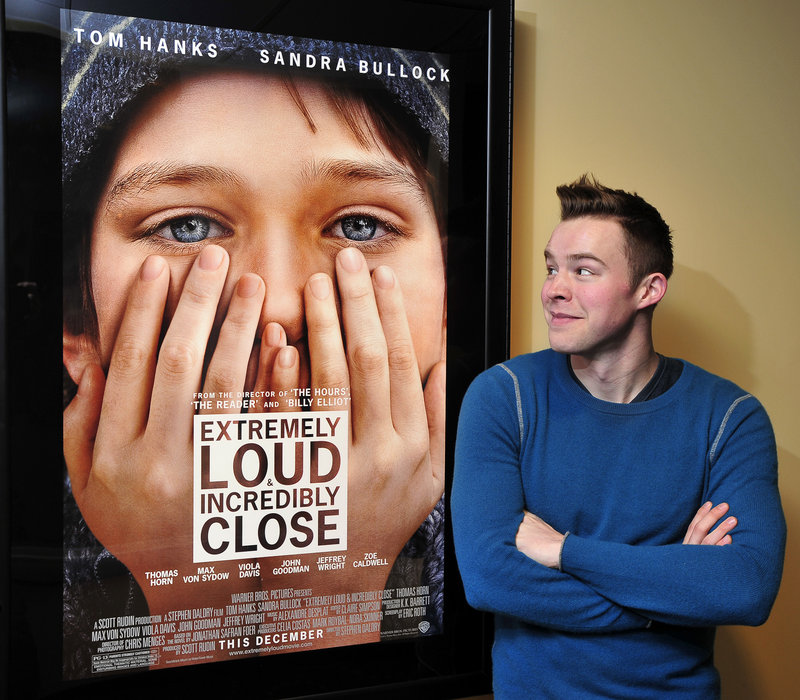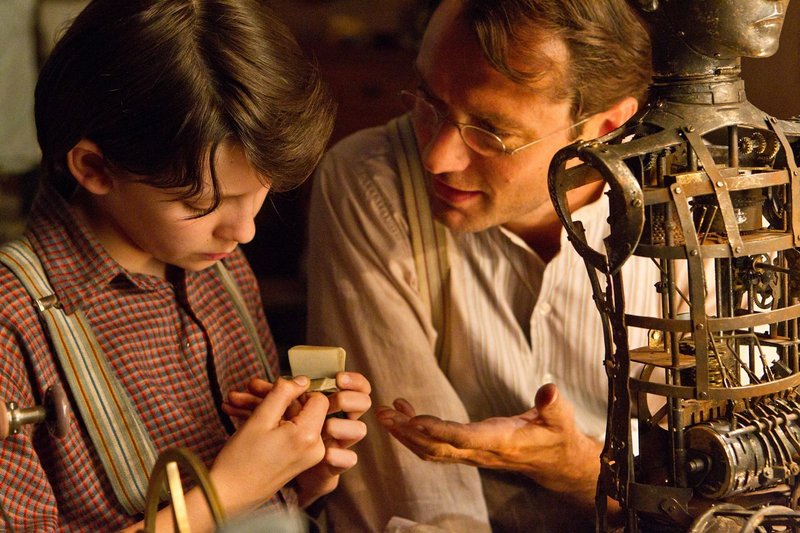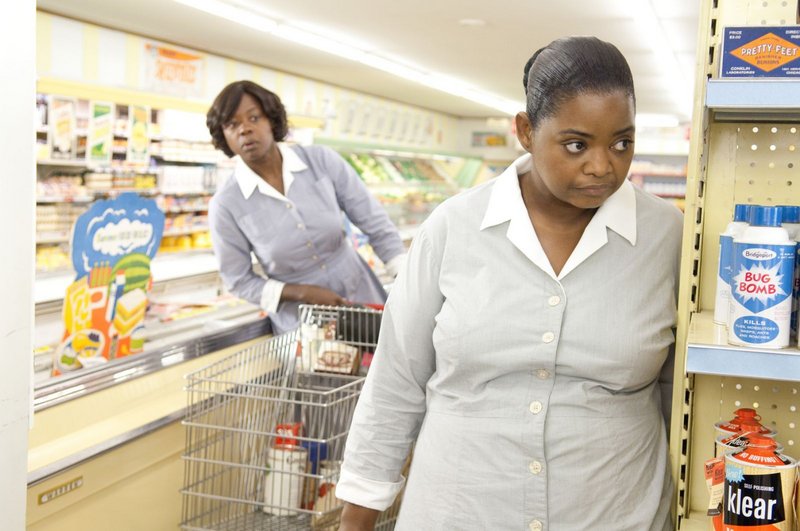Any year in which George Clooney and Brad Pitt are competing against each other for an Oscar, or where gender identity (“Albert Nobbs”), racism (“The Help”), post-9/11 pain (“Extremely Loud & Incredibly Close”), the cost of pro sports (“Moneyball”) and illegal immigration (“A Better Life”) are prevalent themes can’t be described as a quiet one for the Academy Awards.
And yet a silent film, “The Artist” with its 10 nominations, is the major player at this year’s ultimate film event, which airs tonight on ABC.
By now, a wide audience is familiar with “The Artist,” a winsome look at the rise and fall of a charismatic silent screen star. But can this ultimate underdog grab best picture honors? Or will the top prize go to weightier fare like “The Descendants,” a poignant family portrait led by a surprisingly vulnerable George Clooney, or “The Help,” a box-office hit elevated by the power of its three actress nominees?
Will silence be golden? Here are some predictions on what’s likely to happen when the envelopes are opened.
BEST PICTURE
• “The Artist”
• “The Descendants”
• “Extremely Loud & Incredibly Close”
• “The Help”
• “Hugo”
• “Midnight in Paris”
• “Moneyball”
• “The Tree of Life”
• “War Horse”
WILL WIN: In a year when one nominee that looks good on paper was clobbered by bad reviews (the Tom Hanks-Sandra Bullock-starring “Extremely Loud & Incredibly Close”) and another was under-appreciated for its classic style (“War Horse”), the competition here is mostly between the fizzy joys of “The Artist,” the multi-layered drama of “The Descendants” and “The Help,” and the lovely precision of “Hugo.” Expect “The Artist” to prevail, especially because Oscar voters can’t resist a movie that celebrates their own craft.
SHOULD WIN: “The Descendants,” another excellent snapshot of the human heart from director Alexander Payne. It conveys the magnificent, tragic messiness of life through the story of a husband and father coping with revelations in the wake of his wife’s devastating coma.
BEST ACTOR
• Demian Bichir, “A Better Life”
• George Clooney, “The Descendants”
• Jean Dujardin, “The Artist”
• Gary Oldman, “Tinker Tailor Soldier Spy”
• Brad Pitt, “Moneyball”
WILL WIN: George Clooney has never been better. And goodness knows that Gary Oldman deserves to be recognized for decades of superb acting.
But when a performer commands a movie with such throwaway grace, the Oscars tend to give him the gold. Jean Dujardin, prepare to be honored for displaying world-class style, delivering sweet dance moves and making silent films cool again.
SHOULD WIN: Clooney, who succeeded by scrapping his debonair confidence and digging deep to find the place where sorrow, jealousy and wisdom meet in an average man struggling to do his best in an impossible situation.
BEST ACTRESS
• Glenn Close, “Albert Nobbs”
• Viola Davis, “The Help”
• Rooney Mara, “The Girl With the Dragon Tattoo”
• Meryl Streep, “The Iron Lady”
• Michelle Williams, “My Week with Marilyn”
WILL WIN: Although Meryl Streep is technically superb and emotionally on target as Margaret Thatcher, she is burdened with a movie that feels more like a series of quick pencil sketches than a finished portrait.
Viola Davis, on the other hand, takes viewers on a journey into the soul of her character, showing us both the guarded outward composure of an African-American maid in the 1960s South and the strength, anger, tenderness and complexity that define her inner life. For such an epic turn, Davis is bound to take home the statuette.
SHOULD WIN: Davis, a phenomenal actress who finally is getting a chance to show what she can do with a starring role. She conveyed the struggles of a woman in a specific time and place in history, yet made her character’s voice speak for the timeless, universal search for equality and acknowledgment.
BEST SUPPORTING ACTOR
• Kenneth Branagh, “My Week with Marilyn”
• Jonah Hill, “Moneyball”
• Nick Nolte, “Warrior”
• Christopher Plummer, “Beginners”
• Max von Sydow, “Extremely Loud & Incredibly Close”
WILL WIN: Christopher Plummer is on an award-season winning streak. The veteran actor is finally being acknowledged by Hollywood with a rush of appreciation for a lifetime of achievement, as well as his understated portrayal of a senior citizen who comes out as a gay man in order to live his final years with grace and honesty. All these years later, Capt. Von Trapp is still an imposing presence.
SHOULD WIN: Plummer is a fine choice, but if it’s time to single out a legend who’s never won, why not the venerable Max von Sydow, who is downright amazing as a man swaddled in a grief that’s rendered him mute?
It would be an extreme, incredible upset by an actor in a flawed movie, but he deserves it.
BEST SUPPORTING ACTRESS
• Berenice Bejo, “The Artist”
• Jessica Chastain, “The Help”
• Melissa McCarthy, “Bridesmaids”
• Janet McTeer, “Albert Nobbs”
• Octavia Spencer, “The Help”
WILL WIN: Octavia Spencer, for her captivating blend of humor and suppressed fury as a maid with an unforgettable recipe for those who’ve wronged her. It’s the sort of breakthrough performance that makes Oscar voters sit up and pay attention.
SHOULD WIN: Janet McTeer, who quietly steals her movie from star Glenn Close. As a woman impersonating a man in late 19th-century Ireland in order to earn a living wage, McTeer’s immersion in male facial expressions and body movements is beyond impressive. Every time she’s on screen, she brings to life a depressing character study.
BEST DIRECTOR
• Woody Allen, “Midnight in Paris”
• Michel Hazanavicius, “The Artist”
• Terrence Malick, “The Tree of Life”
• Alexander Payne, “The Descendants”
• Martin Scorsese, “Hugo”
WILL WIN: Michel Hazanavicius. By relying on the silent treatment, the French director created a visual treat and a splendid reminder of how movies seduced the world back in the days before sound, much less computers, ruled the industry. It’s filmmaking stripped down to its essentials, and yet it’s sprinkled with the flair of a cinematic maestro.
SHOULD WIN: Alexander Payne, who’s become a bard of contemporary American life. No other director has populated so many movies with such a rich tapestry of characters and such respect for the earth-shaking dramas of ordinary lives. Payne has a Shakespearean appetite for the complicated nature of human behavior and an internal GPS for locating the truth of a situation.
BEST ADAPTED SCREENPLAY
• “The Descendants,” Alexander Payne, Nat Faxon and Jim Rash
• “Hugo,” John Logan
• “The Ides of March,” George Clooney, Grant Heslov and Beau Willimon
• “Moneyball,” Steven Zaillian and Aaron Sorkin, story by Stan Chervin
• “Tinker Tailor Soldier Spy,” Bridget O’Connor and Peter Straughan
WILL WIN: Somebody turned a saga of pro-sports financing into a meditation on mid-life ambition, stunted dreams and the pursuit of happiness? You just hit a grand slam, “Moneyball” guys.
SHOULD WIN: As much as we’d like to tout “The Ides of March,” a movie with snappy dialogue and bold cynicism, “Moneyball” is the clear MVP. It’s a throwback to the 1970s brand of filmmaking that took its time to tell a story and immersed itself in the language of real situations; in this instance, a Major League Baseball organization.
BEST ORIGINAL SCREENPLAY
• “The Artist,” Michel Hazanavicius
• “Bridesmaids,” Annie Mumolo and Kristen Wiig
• “Margin Call,” J.C. Chandor
• “Midnight in Paris,” Woody Allen
• “A Separation,” Asghar Farhadi
WILL WIN: “Midnight in Paris,” Woody Allen’s humorous rumination on the intellectual implications of the grass always being greener in another era. Hollywood admires Allen’s ability to dream up a minor masterpiece every 10 years or so, like this time-traveling truffle that allows the Allen substitute, Owen Wilson, to rub shoulders with Fitzgerald and Hemingway.
SHOULD WIN: “Bridesmaids.” With deceptive ease, Annie Mumolo and Kristen Wiig created female characters who were believable and outrageous. They deftly illustrate why the best comedies are grounded in real-life responses to envy, insecurity, self-delusion, self-loathing and, eventually, acceptance – the five stages of hilarity.
Send questions/comments to the editors.





